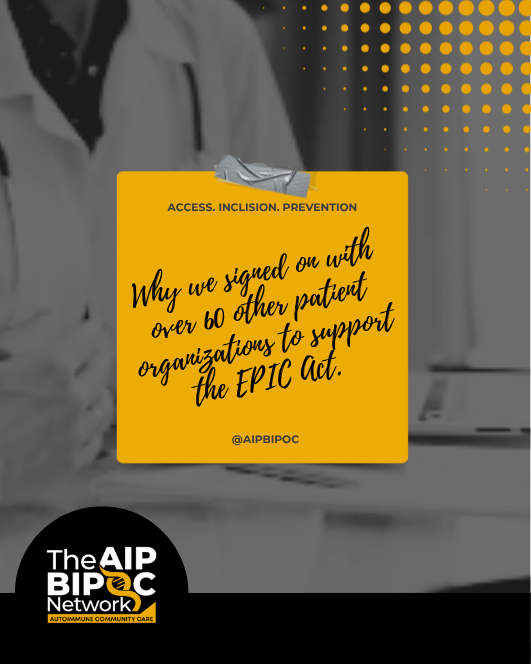

Imagine finding a medication that finally works—one that helps manage symptoms, reduce flares, and restore stability. Now imagine losing access to that medication, not because it’s unsafe or unavailable, but because a policy discouraged its development in the first place.
That’s the concern behind a growing issue in federal healthcare policy, one that could jeopardize access to small molecule drugs for people living with autoimmune disease and chronic illness.
What’s the EPIC Act—and What’s the Problem?
The EPIC Act (Ensuring Pathways to Innovative Cures) is a bipartisan bill introduced to fix a flaw in the Medicare Drug Price Negotiation Program (MDPNP). Created by the Inflation Reduction Act (IRA) of 2022, this program allows Medicare to negotiate prescription drug prices after a certain number of years post-FDA approval.
But here’s the issue:
- Small molecule drugs (pills, capsules, etc.) are eligible for negotiation after 7 years
- Biologics (complex medications often administered by infusion) aren’t eligible until 11 years
This 4-year gap is already influencing how pharmaceutical companies decide where to invest their research. The result? Reduced development of small molecule drugs, which are often more affordable, easier to access, and more manageable for individuals to use at home.
Why It Matters for Autoimmune and Chronic Illness Communities
Small molecule drugs play a vital role in the care of individuals living with chronic and autoimmune conditions. These medications support independence and allow many people to manage symptoms without needing infusion centers, injections, or additional time off work and caregiving responsibilities.
When investment in these drugs declines, so do the options for patients, especially for common chronic illnesses like hypertension, gastrointestinal disorders, and inflammatory diseases. That loss of access can mean:
- Higher out-of-pocket costs
- Greater reliance on biologics and in-office treatments
- Widening health disparities for underserved communities
For Black, Indigenous, and other communities of color, who already face barriers to diagnosis, treatment access, and culturally responsive care, this adds another layer to an already difficult landscape.
Why We Took a Stand

The AIP BIPOC Network joined over 60 national and state organizations in calling on Congress to eliminate the disparity in MDPNP timelines by supporting the EPIC Act. We also support the Executive Order signed in April 2025, which calls on lawmakers to fix what’s being called the “pill penalty.”
Access to treatment shouldn’t be based on the type of medication—it should be based on what works best for the patient. Giving both small molecule and biologic drugs the same fair opportunity for development and use is key to making care more affordable, more equitable, and more innovative.
Take Action
Healthcare policy doesn’t always make headlines, but its impact is deeply personal.
Here’s what you can do:
🟡 Learn more about the EPIC Act (S.832/H.R.1492) – This bill aims to fix the unfair timeline difference that threatens access to small molecule drugs. Read the full bill text here: https://www.congress.gov/bill/119th-congress/senate-bill/832/text
🟡 Contact your members of Congress – Ask them to support the EPIC Act and help protect access to treatment for those living with chronic and autoimmune conditions. Find your representatives here: https://www.congress.gov/members
🟡 Share this blog – Help others in the autoimmune and chronic illness communities understand what’s at stake.
🟡 Join The AIP BIPOC Community – Connect with others, find resources, and get involved in advocacy that centers equity and lived experience: https://aipbipoc.mn.co
Final Thoughts
When we talk about access, we’re not just talking about insurance coverage or pharmacy shelves. We’re talking about dignity. About the ability to live fully and manage illness with tools that meet people where they are.
Policies that discourage innovation in small molecule drugs ultimately hurt patients—especially those already facing barriers due to race, income, geography, or chronic illness stigma.
Equity in care means equity in treatment development. It means ensuring that life-changing medications are not only created but remain accessible to the people who need them most.
Let’s keep pushing for policies that reflect that.
Leave a Reply
Looking for other ways to get involved?
Volunteering for The AIP BIPOC Network offers a unique opportunity to make a significant impact in the lives of BIPOC individuals living with autoimmune diseases, fostering a more inclusive and equitable community. Join us and contribute your skills to support our mission of advocacy, health equity, and positive health outcomes.
Volunteer With The AIP BIPOC Network
Stay in the loop with all things AIP BIPOC!
Join The AIP BIPOC Network Email List
Stay informed and connected by subscribing to The AIP BIPOC Network newsletter! Get the latest updates on our initiatives, upcoming events, and ways you can support and empower BIPOC individuals living with autoimmune diseases straight to your inbox.
(C) 2025 THE AIP BIPOC NETWORK , INC
privacy policy